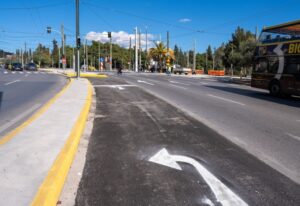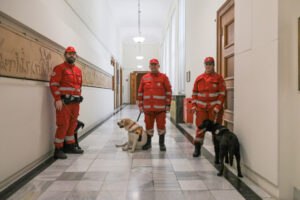In the decades since the fall of the Ceausescu dictatorship, Romania has experienced one political crisis after another. The same has been the case in recent months following the cancellation of the November presidential election.
In this case, however, there is an important difference compared to past political crises in the country: never since 1990 have there been such strong anti-Western and to some degree pro-Russian forces in Romania as there are now. And never in the last 35 years has there been such strong discontent in Romanian society.
Last Sunday night saw demonstrations in Bucharest that were marked by serious clashes. Citizens and supporters of conservative parties poured into the streets of the capital and getting into violent clashes with police forces. It was only one of the many such protests with thousands of people that police tried to break up violently since the decision of Romania’s Central Electoral Bureau (BEC) to disqualify Calin Georgescu from the new presidential election, due to be held in May. The reason he was disqualified from the new elections was that Georgesku had made certain statements that -allegedly- contradict his obligation as president to protect the constitution.
In November, Georgescu won the first round of elections and today he is still the most popular candidate based on polls. However, the Constitutional Court decided to annul the election because it claims that Georgescu financed his campaign through “illegal means” and Russia allegedly attempted to intervened in the proceedings through…cyber-attacks in favour of Georgescu. However, no proof, especially about the latter, has been provided.
The Georgescu case took on international dimensions when the US Vice President, J.D. Vance, referred to it at the Munich Conference as “proof” that democracy no longer exists in Europe.
Georgescu wants to overthrow the political elite. He states that he is already the president of Romania and that he embodies the will of the entire Romanian people.
How did it get to this point?
Behind this absolutely dysfunctional situation that exists in Romania today, however, there is a chronic mismanagement, which consists mainly in the absence of political will for reforms and for a more sound, transparent and sustainable governance on the part of the political elite.
Although at the macroeconomic level Romania has shown strong growth in recent decades, many areas of the province are in poor condition and face additional problems due to illegal immigration. The country is plagued by corruption, nepotism, misappropriation of public money by the elite, lack of transparency in state processes and political influence in the judiciary. At the same time, the development of the country’s infrastructure is proceeding slowly and with many obstacles, often even without a concrete plan. The education system is also in need of major reforms, but these are not being implemented.
In all of this, Georgescu found the opportunity to spread his positions on social media platforms, in interviews and public statements.
Doubts surrounding the Georgescu case
Claus Johannis, who has served as president since 2014, promised at the beginning of his term to undertake radical reforms but never delivered on that promise. As a result, three right-wing and far-right parties gained increasing traction in Romanian society, reaching 35% in the December 2024 parliamentary elections.
The political elite is now accused of seeking to stop Georgescu by undemocratic means. And indeed there are several questions about the development of the proceedings against Georgescu. For example, since 2022, the authorities have initiated criminal proceedings against Georgescu for “praising the fascist Iron Guard movement”, which was very active in Romania from 1927 until World War II. Even in November 2024, however, there was no provision for disqualifying a candidate from the presidential election for doing so.
On Tuesday (11 March), the Romanian Constitutional Court finally ruled that Georgescu is not allowed to participate in the May presidential election. However, as journalist Ioana Ené Dogoiu pointed out, “this does not mean that now everything is fine and we continue as before. We are in a deep crisis, with a wounded democracy, a polarized society, stripped institutions and a profound distrust of political leadership among voters. These are major problems, which Georgescu has simply exploited. And as long as they continue to exist, it is only a matter of time before the next person exploits them as well.“
Ask me anything
Explore related questions





